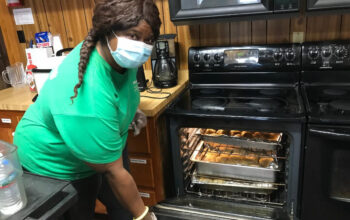Covington Weekly made five years old this past February. The ideas that led to the creation of a localized weekly newsletter for the downtown area included working to raise funds for area non-profits and the establishment of a community food coop program. The Northshore Food Coop exists as a facebook page, with group members connecting online for particulars on food and produce availability, farming tips, advice and other kinds of food production related information.
In terms of community revitalization, an effective way to revitalize an area is to establish and sustain some degree of self sufficiency. One component to this goal could be the founding a neighborhood food cooperative. It could act as a community center, with food and nutrition education aspects, a teaching kitchen and live gardens.
During World Wars I & II, the Federal Government urged local neighborhoods to participate in community gardens in order to ease the burden of food production. Today, facing rising food costs, blatant market manipulation and questionable food production practices, a return to a model of food self sufficiency like the historic “Victory Gardens” could alleviate, if not eliminate these concerns.

The following excerpt is from “Fresh Ideas for Building Healthier Communities, Revitalizing a Community Beginning with Health”, By Jeffrey Schwartz, Exec. Director of Broad Community Connections and Robin Zimbler, Senior Project Manager at L+M Development Partners:
“When neighborhoods lack access to healthy food, it signals not only serious public health challenges, but lagging economic and community development. While improving access to nutritious and fresh foods addresses obstacles to healthy eating, it is only a partial solution for building a vibrant, local economy. How do we best strengthen vulnerable neighborhoods that experience little community development and persistent food insecurity? In our experience, this requires a holistic approach that addresses the needs of a community in the short- and long-term.
Our work in New Orleans, where Broad Community Connections (BCC) and L+M Development Partners (L+M) recently broke ground on the ReFresh Project, is an example of doing just that: addressing multiple
community needs at once. The ReFresh Project, a 60,000-square-foot adaptive reuse development, will include a new Whole Foods Market, Liberty’s Kitchen— a nonprofit with the dual purpose of providing culinary and life-skills training for at-risk youth and healthy meals for public schools — and Tulane University’s new Center for Culinary Medicine, a first-of-its kind teaching kitchen for community members, medical students, and practicing medical professionals.
With ReFresh, our aim was not just to promote health by bringing better food options to residents, but to create a transformative project that would engage the community and anchor economic and community development in a historically under-served area of New Orleans.”
Editor’s Note: While other methods of funding besides attracting a corporate anchor may be available, the ideas presented are very similar to those discussed previously, and may be structured on a smaller scale to serve smaller neighborhoods. This program resonates with us at CW due to the history of agricultural trade and production in the area, as well as the research previously undertaken for the food coop. CW encourages discussion of ideas to solve issues faced by the community, and CW does not claim any solution to be better than another. Email [email protected] or call 985-288-9609.



